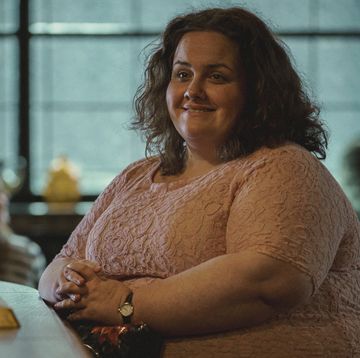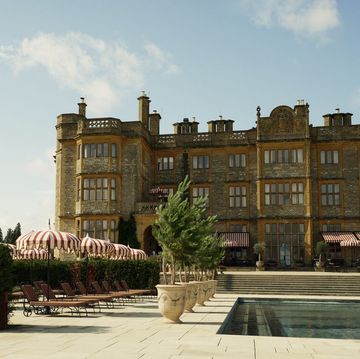Writer Katie Glass on the transformative powers of getting away...
Last year, my friend committed suicide, my bipolar mother was spiralling again, my older brother had stopped talking to me after a row at Christmas, and my dad – who died three years before – was in my head, reminding me of just how much I still needed him. Then my flatmates and I got kicked out of our home.
I tried to cope by self-destructing. I spent money in fits, downed shots in Soho, went home with boys who’d never remember my name. I gorged. I stopped eating.
I even fell in love: running away from London to Somerset to be with my first boyfriend and spending five months feeling 16 again. Then one day, the afterglow of good sex faded. I told him it was over and destroyed him, too.
I was desperate to feel better, but I was such a mess I’d forgotten how happiness felt. So this year, in the midst of my self-destruction, I did something that in my alcohol-fuelled twenties I’d never been crazy enough for: I booked myself onto a retreat. An intensive Change Your Life week in Spain. I would run away and ‘find myself’.
The night before leaving, I downed mojitos with my gay best friend, cackling about the hippie-dippy torture that lay ahead. I’d come back enlightened, in tie-dye trousers. Ha! It was only when I stood sober at the airport that I realised it might not be that funny.
I am not someone who goes on retreats. I hate retreats because I hate hippies, because my mother was one. When we were little, she went to summer solstice and dance workshops, where middle-aged women writhed on the floor. So when I left home, I got a job at the Daily Mail – a world away from my mum’s ideals. My life now revolves around working, shopping and drinking in members’ clubs. I don’t do homebody or tree-hugger.
I also hate retreats because I have a deep-seated suspicion of talking about feelings, which I haven’t done since I was 19 when a psychiatrist told me my mum was bipolar and I knew if I let myself feel anything, I would never recover from the pain. I was proud of my ability to absorb trauma like a sponge. I felt nothing as my mother was sectioned repeatedly. Then my dad died, and I felt nothing about that either. Now I am going on a retreat, which is designed to prompt a life-altering epiphany, and I’m afraid I may not be capable of one. Maybe I don’t want to change my life after all. Maybe I can just carry on drinking and dancing and falling in love with exes forever.
Jessica McGregor Johnson, who runs the retreat, meets me in arrivals. To my relief she doesn’t look hippie at all. She looks like a gym instructor, with Clare Balding’s hair and hiking boots. We head to Spain and the Alpujarras mountains and she tells me her life story: married and living in England, she had a sort-of breakdown and ran away to an ashram in India, then another in New York, where she met a woman with whom she fell in love. She has studied counselling, hypnotherapy, and neuro-linguistic programming, which she uses to get to the root of people’s problems on these small group retreats. My hippie radar is going off – what if she makes my life even messier? But it’s too late to turn back now.
The retreat is set in a 400-year-old Spanish villa: all whitewashed walls and airy courtyards scented with freesias. My room used to be the goat shed – but there are no Cowshed toiletries, no TV and no minibar. Jessica asks me to turn off my laptop and phone. I stuff them in the wardrobe and sit on my white-sheeted bed, looking at the white tiles and white walls and hugging a white cushion. It’s a Zara Home asylum. I think I will say this on Twitter, so I get my iPhone back out. There is no signal.
We meditate in the morning. Jessica asks if I’ve tried before. Once, I say. I do not tell her the truth: I am afraid of meditation. Jessica thinks it clears your head, relaxes your mind and opens you up to yourself, but if I am forced to sit still in silence my brain floods with the dark thoughts that circle constantly overhead. Which is why I work and talk constantly. Why I sleep with the radio on.
We sit on a stone circle at the mountain’s foothills. We breathe deeply: in, out, in, out. ‘If your mind wanders,’ says Jessica, ‘take the thought, put it on a cloud and let it drift off.’ Soon enough I have a rainstorm brewing overhead. My self-hatred, my mother, my brother, my ex-boyfriend and everyone who has ever dumped me are all threatening to come down in torrents. I hate meditating – it feels like an hour, rather than the 10 minutes I manage.
The next exercise is worse. It is called The Wheel of Life. I must draw a circle and slice it into nine wedges, for personal growth, career, social life, finances, contribution to the world, health, home environment, relationships and family. I have to give each a mark out of 10. I’m feeling pretty good about my scores – all above five, just about – until I get to family and relationships. I automatically put zero and feel a familiar stab of pain. Where is this torture going? I came here to escape my life and instead I’m being thrown headfirst into my problems.
To complete my Wheel of Life I have to connect up my scores to draw a circle. Except it’s not a circle, is it? It’s a deflated balloon: bulging at career and social life then withering away. I’m angry with Jessica for making me map out this mess and annoyed she wants to talk about how this feels. It’s obvious how it feels, isn’t it? My circle is damaged in the same ways I am and it feels like s***.
But, rather than focus on my wonky circle, she encourages me to think of ways to improve it. So we do something called The Passion Test, writing a list of quick-fire sentences beginning, ‘When my life is perfect, I am…’
OK, that’s easy. When my life is perfect, I am rich, successful, having fun. I’m a famous journalist with a best-selling novel. I own my own flat that nobody can kick me out of. I like this list – it writes itself. Then I inexplicably add, ‘I’m in a secure, long-term relationship.’ Suddenly I hate the list. Because it wants things I know I can’t have.
But I have to carry on, to create a mental image of what I came here to find. This is easier to picture if I give it markers, she says – tangible things I’ll experience when everything is OK. ‘Until you allow yourself to admit what you want and picture it, you won’t be able to do it.’ Fine. I’ll win a Booker Prize. I’ll own my own home. ‘And the relationship?’ I can’t picture it at all. I have lumped all my relationships in one angry, impossible mess. ‘How does that make you feel?’ asks Jessica. Unhappy, I say. ‘And how does it make you act?’ she asks. Unlovable, I admit. I have to unpick this messy knot and let go of this sadness, otherwise my life will always be a deflated balloon.
That afternoon I walk up the mountain and watch wisps of smoke swirling up the cliff face ahead. I think back to when I was small, when we lived in Wales, my dad chopping logs to be licked by flames on the hearth at night. We left Wales for Somerset when I was 10 and everything changed. My parents divorced and my mother’s mind disintegrated. She stopped buying food, paying bills. My brother and I joked it was like Ab Fab because the only thing in the fridge was champagne. Then my brother left home and I had no one to laugh with.
I watch the smoke and feel my eyes water. I am crying now. For my friend, my dad, my mum. For me, and all the things I’ve never acknowledged were important. I think how lonely I’ve been. Blinking at the wisps, I realise it’s not smoke at all. I am sitting in the clouds.
The next morning we meditate again. I have not morphed into Buddha but I do sit still, and I do not hate myself quite so much. I think about my mum – and it is not quite so painful. I think about my dad, and there is the soft warmth of love. I think about my brother, because we’re always rowing, and I know I can fix things. Then Jessica asks me to imagine my perfect man and this time I don’t feel afraid to try. He is kind and supportive. And he adores me. I make a marker: I am waking up in the morning. I kiss him. This time neither he nor I run away.
The last thing we do is to write down baby steps I can take once I’m home to work towards my goals. I will see a mortgage advisor. I will plot my novel. I will call my brother. This feels good, this wanting things. I make 20 tiny promises to myself. I start with ‘I will go on a date’ and work up to ‘I will allow myself to feel love’.
Back home, there’s a pile of unpaid bills. When my life is perfect, I think grumpily, I am not well into my overdraft. Then I pull a jumper over my tan, crawl under the duvet and dig out my to-do list. The tiny promises that seemed bite-sized in Spain now look inedible. I chew them over, then choose one, and pick up the phone.












